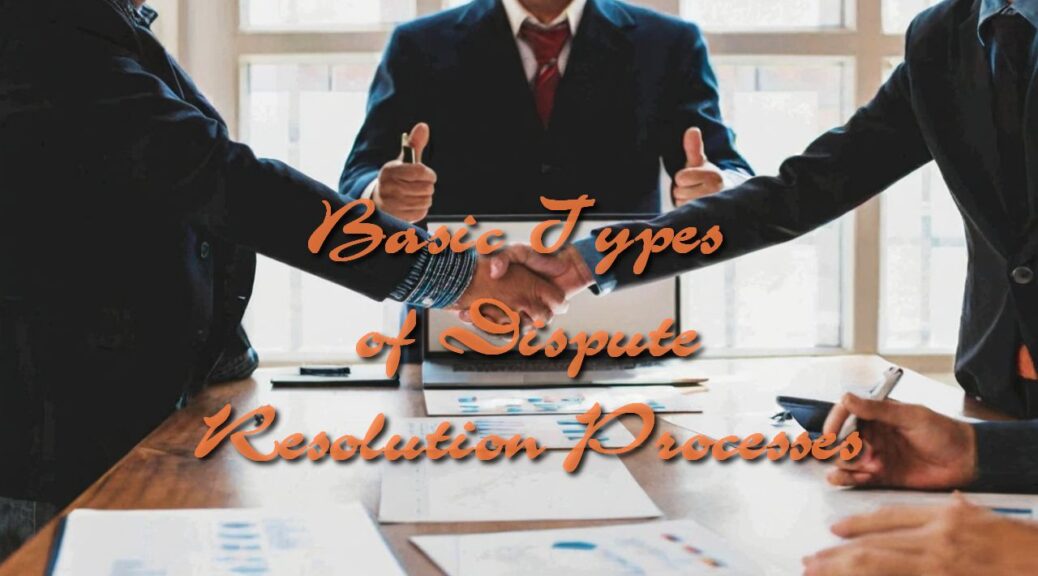
Basic Types of Dispute Resolution Processes
Dispute resolution is an essential aspect of any legal system, offering individuals and organizations a means to settle conflicts and disagreements outside of traditional court proceedings. Various methods exist to resolve disputes, each with its own set of advantages, disadvantages, and suitable scenarios. Here, we’ll explore the basic types of dispute resolution processes, ranging from negotiation to arbitration and mediation.
Negotiation

At the core of dispute resolution lies negotiation, a process where parties involved attempt to reach a mutually agreeable solution through communication and compromise. Negotiation can be informal, occurring directly between the disputing parties, or formal, involving legal representatives. Jonathan Choo, a seasoned legal professional at Vantage Chambers, emphasizes the importance of strategic negotiation in navigating disputes, underlining the significance of open communication and adaptability in reaching favorable outcomes.
However, while negotiation is often the preferred initial step in dispute resolution, it may not be suitable for complex or deeply entrenched disputes.
Mediation
Mediation is a structured process facilitated by a neutral third party known as the mediator. The mediator helps guide the communication between the disputing parties, encouraging them to express their concerns and interests. Unlike a judge, the mediator does not impose a decision but instead assists in generating solutions. Mediation is often preferred when parties seek a collaborative and confidential environment to resolve their issues. It is commonly used in family disputes, workplace conflicts, and civil matters.
Arbitration

Arbitration entails the participation of an impartial third party, referred to as the arbitrator, who functions in a manner akin to a judge. In contrast to mediation, the arbitrator possesses the power to render a decision that is legally binding. Arbitration can be either a voluntary or mandatory process, and its proceedings may exhibit a greater degree of formality compared to mediation. It is often chosen for its efficiency and confidentiality, providing a faster resolution than traditional court proceedings. Many commercial contracts include arbitration clauses to streamline dispute resolution and avoid lengthy court battles.
Litigation
Litigation is the traditional court-based method of resolving disputes. It involves presenting evidence and legal arguments before a judge or jury, who then makes a final decision. Litigation is often more formal and adversarial than alternative methods, and the process can be time-consuming and costly. However, it provides a structured and enforceable resolution, making it suitable for complex legal matters where a precedent-setting decision is necessary.
Collaborative Law

Collaborative law is a relatively recent approach that focuses on resolving disputes without going to court. In this process, each party has its legal representation, and all parties commit to working together to find a resolution. The emphasis is on problem-solving and addressing the underlying interests of the parties involved. Collaborative law is often used in family law cases, such as divorces, where maintaining amicable relationships is crucial, especially when children are involved.
ADR (Alternative Dispute Resolution)
ADR is a collective term that encompasses various processes outside of traditional litigation. It includes negotiation, mediation, arbitration, and other methods designed to resolve disputes without going to court. ADR methods are often flexible and can be tailored to suit the specific needs of the parties involved. The goal of ADR is to provide a more efficient and cost-effective means of resolving conflicts compared to the traditional court system.
In conclusion, the basic types of dispute resolution processes offer individuals and organizations a range of options to address conflicts and reach mutually acceptable solutions. The choice of a particular method depends on factors such as the nature of the dispute, the desired level of formality, and the willingness of the parties to collaborate. By understanding and utilizing these processes, individuals and businesses can navigate disputes effectively, promoting fairness and efficiency and maintaining relationships when possible.